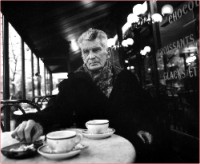| Author Profile
Samuel Beckett
Compiled by Mahdin Mahboob
 Samuel Barclay Beckett, also known as Andrew Bellis, is perhaps best known for the timeless play 'Waiting for Godot' in which the characters wait for a man (Godot) who never arrives. Born in 13th April, 1906 in Dublin, Ireland this famous author was awarded the Nobel Prize in Literature in 1969 'for his writing, whichin new forms for the novel and dramain the destitution of modern man acquires its elevation'. Samuel Barclay Beckett, also known as Andrew Bellis, is perhaps best known for the timeless play 'Waiting for Godot' in which the characters wait for a man (Godot) who never arrives. Born in 13th April, 1906 in Dublin, Ireland this famous author was awarded the Nobel Prize in Literature in 1969 'for his writing, whichin new forms for the novel and dramain the destitution of modern man acquires its elevation'.
Beckett's work is stark, fundamentally minimalist, and, according to some interpretations, deeply pessimistic about the human condition. His work grew increasingly cryptic and attenuated over his career.
The perceived pessimism in Beckett's work is mitigated both by a great and often wicked sense of humour, and by the sense, for some readers, that Beckett's portrayal of life's obstacles serves to demonstrate that the journey, while difficult, is ultimately worth the effort. Similarly, many posit that Beckett's expressed 'pessimism' is not so much for the human condition but for that of an established cultural and societal structure which imposes a stultifying will upon otherwise hopeful individuals; it is the inherent optimism of the human condition, therefore, that is at tension with the oppressive world. Peter Brook says in The Empty Space that if you believe that Beckett is pessimistic, then you are a Beckett character trapped in a Beckett play; Beckett was not saying "No" because he wanted to, but was saying no because he was searching for the "yes".
Beckett played for the Dublin University Cricket team and played two first-class games against Northamptonshire. As a result, he became the only Nobel laureate to have an entry in Wisden Cricketers' Almanack, the 'bible' of cricket.
Beckett is most renowned for the play Waiting for Godot. In a much-quoted article, the critic Vivian Mercier wrote that Beckett 'has achieved a theoretical impossibilitya play in which nothing happens, that yet keeps audiences glued to their seats. What's more, since the second act is a subtly different reprise of the first, he has written a play in which nothing happens, twice.' The play was first written in French with the title En attendant Godot. Beckett worked on the play between October 1948 and January 1949. He published it in 1952, and premiered it in 1953. The English translation appeared two years later. The play was a critical, popular, and controversial success in Paris. It opened in London in 1955 to mainly negative reviews, but the tide turned with positive reactions by Harold Hobson in The Sunday Times and, later, Kenneth Tynan. In the United States, it flopped in Miami, and had a qualified success in New York City. After this, the play became extremely popular, with highly successful performances in the U.S. and Germany. It is still frequently performed today.
Of all the English-language modernists, Beckett's work represents the most sustained attack on the realist tradition. He, more than anyone else, opened up the possibility of drama and fiction that dispense with conventional plot and the unities of place and time in order to focus on essential components of the human condition. Writers like Václav Havel, John Banville, Aidan Higgins and Harold Pinter have publicly stated their indebtedness to Beckett's example, but he has had a much wider influence on experimental writing since the 1950s, from the Beat generation to the happenings of the 1960s and beyond. In an Irish context, he has exerted great influence on poets such as John Banville, Derek Mahon, Thomas Kinsella, as well as writers like Trevor Joyce and Catherine Walsh who proclaim their adherence to the modernist tradition as an alternative to the dominant realist mainstream.
Beckett is one of the most widely discussed and highly prized of twentieth century authors, inspiring a critical industry to rival that which has sprung up around James Joyce. He has divided critical opinion. Some early philosophical critics, such as Sartre and Theodor Adorno, praised him, one for his revelation of absurdity, the other for his works' critical refusal of simplicities; others such as Georg Lukacs condemn for 'decadent' lack of realism.
Copyright
(R) thedailystar.net 2007 |
